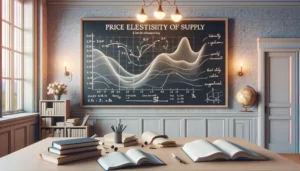In economics, the concept of scarcity is a fundamental principle that underlies all economic theories and practices. At its core, scarcity refers to the basic economic problem of having seemingly unlimited human wants and needs in a world of limited resources. In other words, it is the fundamental economic problem of having human needs and wants, but scarce resources.

✅ AI Essay Writer ✅ AI Detector ✅ Plagchecker ✅ Paraphraser
✅ Summarizer ✅ Citation Generator
Understanding Limited Resources
The resources referred to in this context aren’t just physical items like commodities or goods. Resources encompass all factors of production, including:
- time
- human labour
- natural resources
- and capital.
Given their finite nature, resources must be managed efficiently to maximize their utility.
Wants, on the other hand, represent the desires of consumers. Whether it’s a new pair of shoes, a faster internet connection, or healthcare services, our wants are virtually unlimited and continuously evolving. In contrast, our ability to meet these wants is restricted by our limited resources.
The Principle of Demand and Supply
The principles of demand and supply, integral components of any market, are profoundly influenced by scarcity. Scarcity creates competition for resources, leading to the need to make choices. Demand refers to consumers’ desire to purchase goods and services at certain prices, while supply represents how much the market can offer.
Allocation & Opportunity Cost in Economics
One of the key aspects that scarcity impacts in economics is the allocation of resources. Given the limited nature of resources, economics as a discipline seeks to understand how resources are distributed or allocated among various potential uses.
The concept of opportunity cost is also intrinsically linked to scarcity. Whenever choices are made in the allocation of scarce resources, opportunity costs are incurred. The opportunity cost of a decision is the value of the best alternative that was not chosen.
Market Equilibrium: Striking the Balance
Market equilibrium is an economic concept that illustrates the state of a market where demand and supply achieve a perfect balance. This equilibrium condition is the point at which the quantity of goods or services demanded by consumers perfectly equals the quantity that suppliers are willing to produce and sell. It represents a stable market scenario where neither surplus nor shortage exists and provides a snapshot of a market at rest.
Scarcity plays a critical role in establishing this balance. Since scarcity underscores the limited availability of resources, it directly impacts the supply side of the equation. In other words, suppliers can only produce as much of a product or service as their resources permit. On the demand side, scarcity can induce a sense of urgency among consumers to purchase goods or services, fearing their short supply.
The market equilibrium price, also known as the market-clearing price, is the price that corresponds to this state of balance:
- This price level represents a consensus between buyers and sellers on the value of a good or service.
- It is the price at which consumers are willing to purchase exactly the quantity of a product that suppliers are willing to produce and sell.
- In a free market, changes in supply or demand conditions will trigger price adjustments, which ultimately lead back to a new equilibrium state.
It’s important to note that market equilibrium is a dynamic state. Changes in factors like consumer preferences, technology, and resource availability can all disrupt the balance, prompting the market forces of demand and supply to react. The consequent shifts in demand or supply move the market towards a new equilibrium, perpetuating a constant process of adjustment and balance, all under the overarching impact of scarcity.
In Conclusion
Scarcity, an intrinsic facet of our world, poses significant challenges but also opportunities. By dictating the necessity for choice, it lays the foundation for the study of economics. It propels us to make decisions that strive to maximize our satisfaction given our limited resources.
FAQ
Why is scarcity important in economics?
Scarcity is of fundamental importance in economics as it necessitates the need for choice. It is scarcity that leads to the necessity for allocation of resources and the need to forgo one alternative in favor of another, thereby giving rise to the concept of opportunity cost.
How does scarcity impact economic decision-making?
Scarcity directly influences economic decision-making by forcing individuals, firms, and governments to make choices on how to allocate their limited resources to satisfy unlimited wants.
What are the causes of scarcity in economics?
Scarcity in economics is caused by a combination of limited resources and unlimited wants. Resources can be limited due to factors like resource depletion, population growth, and technological limitations.
Can scarcity be eliminated in an economy?
Scarcity, by its nature, is a constant condition due to unlimited wants and finite resources. While advancements in technology and changes in consumption patterns can mitigate scarcity, it cannot be completely eliminated.
What is the relationship between scarcity and opportunity cost?
Scarcity creates the need for choice, and every choice involves a trade-off. The opportunity cost is the value of the next best alternative that is given up when making a choice.
How does scarcity affect supply and demand?
Scarcity can increase the price of goods and services, as when something is scarce, it can increase demand and decrease supply, leading to higher prices.
What role does scarcity play in market competition?
Scarcity enhances market competition as businesses compete for limited resources and consumers compete for limited goods and services.
How can scarcity be managed in the economy?
Scarcity can be managed through effective resource allocation, economic planning, and technological innovation.
What are some examples of scarcity in economics?
Examples of scarcity include water scarcity in regions with low rainfall, oil shortages, and labor scarcity in a highly specialized field.
What is the difference between Scarcity vs. abundance in economics?
While scarcity refers to the limited availability of resources, abundance refers to the situation where the supply of resources exceeds the demand.
How does scarcity affect resource allocation in economics?
Scarcity necessitates resource allocation, which involves deciding how to distribute and use scarce resources to satisfy human wants and needs.
Follow us on Reddit for more insights and updates.





Comments (0)
Welcome to A*Help comments!
We’re all about debate and discussion at A*Help.
We value the diverse opinions of users, so you may find points of view that you don’t agree with. And that’s cool. However, there are certain things we’re not OK with: attempts to manipulate our data in any way, for example, or the posting of discriminative, offensive, hateful, or disparaging material.